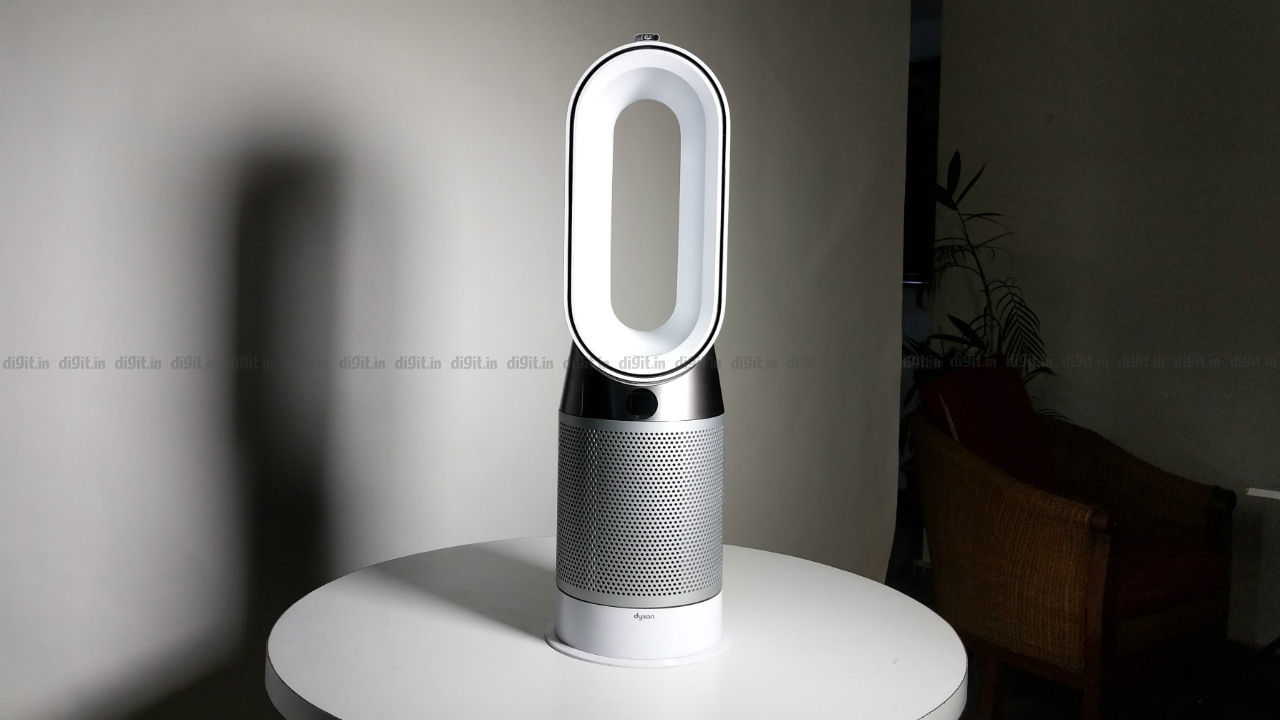
The Dyson Pure Hot+Cool air purifier was launched back in February, in India. Priced at Rs 54,900, the air purifier not only builds on the features and capabilities of its predecessors but it also has some new tricks up its sleeve. As the name suggests, the Dyson Hot+Cool air purifier is not only capable of purifying air, but it can also circulate warm/hot air inside a room, thanks to a heating element that it comes equipped with. However, will new features enhance the device’s functionality or will it impede its purification capabilities?
Performance
When measuring the reduction in air pollution, performance is what matters most. While we do state that features like IoT connectivity, sensors and a digital display add value to a device, its first and foremost function is to purify air. We have previously seen Dyson air purifiers perform well in moderate pollution levels when the PM2.5 level ranged between 150-250 µg/m3 and for the Dyson Pure Hot+Cool air purifier, we tested it for a longer period of time to see if its air filtering efficiency holds up over time.
We ran the air purifier in our three test rooms for 45 minutes and noted PM2.5 and PM10 levels before, after and randomly in-between. Do note that the particulate levels we measured are represented in µm/m3 and the lower these readings, the better the air quality could be. Before commencing the test in room 1, PM2.5, PM10, and the overall AQI (Air Quality Index) readings were 174, 198 and 224 respectively. After running the air purifier for 45 minutes, we measured the readings to find that the Dyson Pure Hot+Cool managed to bring the PM2.5 levels down to 52, PM10 to 48 and the overall AQI to 141. In the limited time tests we performed, the air purifier did a commendable job of reducing particulate levels in room 1.
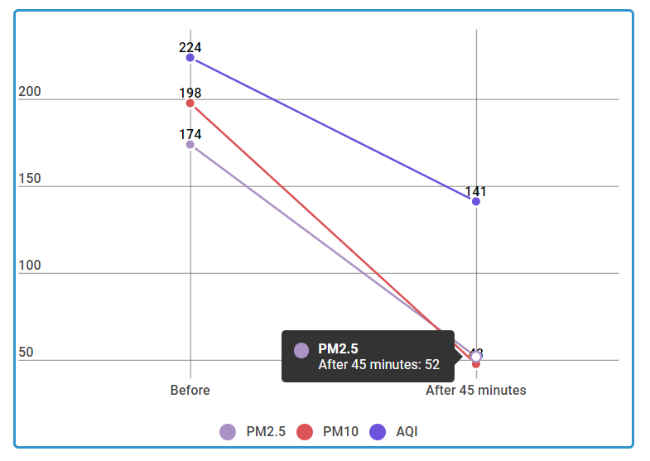
Coming to the second room, we recorded PM2.5 levels at 184, PM10 at 211 and AQI was at 234. It should be noted that these levels are still well above the permissible limit in India, which are set at 60 µg/m3 for PM2.5 and 100 µg/m3 for PM10 particulates. After 45 minutes of testing, the Dyson Pure Hot+Cool was able to reduce the PM2.5 levels to 45, PM10 to 53 and the overall AQI to 124. In this case too, the air purifier successfully brought down the particulate levels under permissible limits.
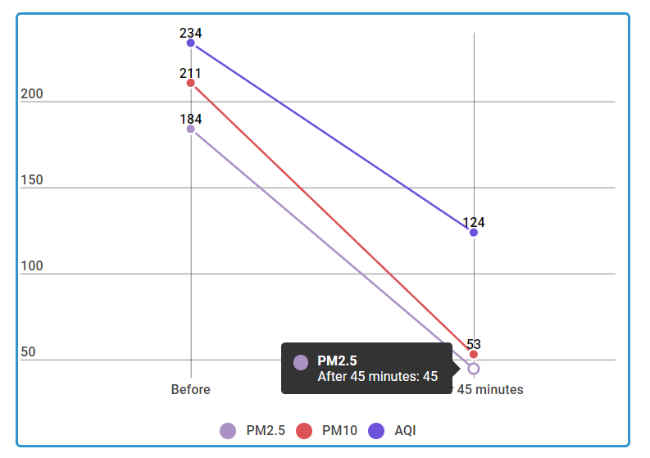
As mentioned earlier, room number 3 is one of our conference rooms that is well maintained. The PM2.5 and PM10 levels were already under the limit at 58 and 44 respectively and the AQI was recorded at 151, which falls in the moderately polluted range. After 45 minutes of runtime, the PM2.5, PM10 and AQI levels were recorded at 37, 30 and 104 respectively. Lowering already low levels of pollutants can be difficult for air purifiers but the Dyson Pure Hot+Cool performed well in this case too.
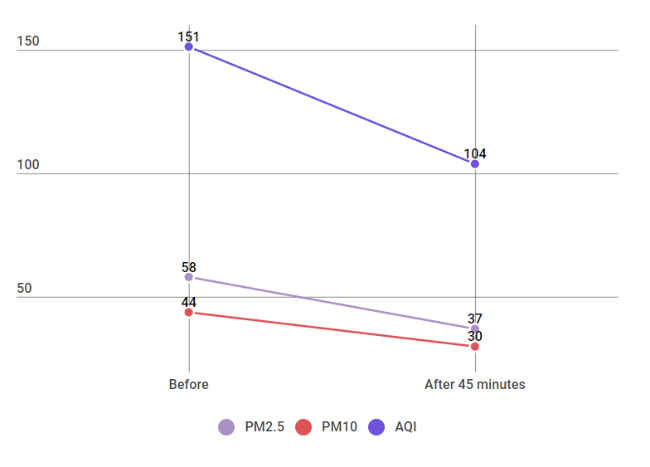
Overall, after testing the Dyson Pure Hot+Cool air purifier in moderate air pollution levels, we found that its air circulation and purification capabilities are on point. In addition, our extended duration of our testing spanned over two months and in this time, we didn’t record any drop in the air purifier’s purification capabilities. However, it is recommended to dust the lower module of the device that houses the filters once in a couple of weeks since it captures most of the dust and bigger particles.
Build and design
We have already applauded Dyson for coming up with a really good air purifier design. The Dyson Pure Hot+Cool air purifier also features a tower air purifier design, similar to its other siblings like the Dyson Pure Cool air purifier. Features like propelled air projection and good air circulation are enabled by the device’s unique design, which are usually missing on most other air purifiers. The glossy ABS plastic it is constructed from is not only sturdy but it also imparts a sleek and stylish look to it. The Dyson Pure Hot+Cool air purifier takes up minimum space and it definitely stands out in a home instead of simply blending in with the background.
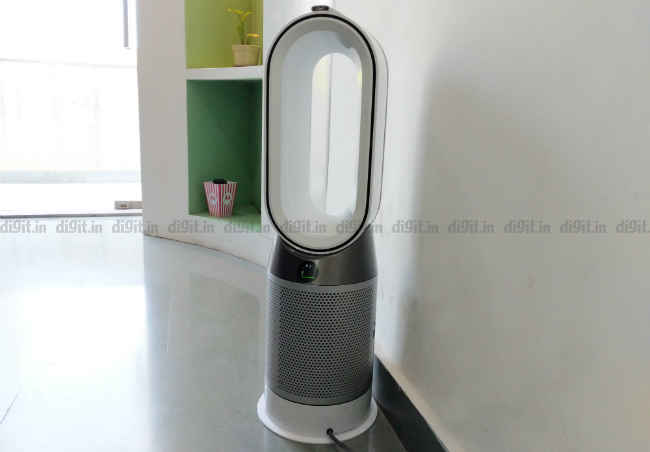
The Dyson Pure Hot+Cool air purifier sucks air in from the circular module at the bottom, which houses the air filters, and expels it from the upper tower. However, since the bladeless top of the purifier projects air via thin slits, the air is pushed out with considerable force and this enables the device to double up as a fan. It should be noted though that the air thrown out is not cooled, but it can be warm in case you are using the heating feature.
While the build and design of the new Dyson Pure Hot+Cool air purifier are almost similar to Dyson’s previous tower styled air purifiers, the company has added one additional design feature this time. The new air purifier can tilt forward and backward so that one can adjust the angle at which it is blowing air. This comes in handy not only when the device is kept on the floor but if it is elevated on a table. The air purifier can also oscillate 350 degrees and comes with an alternate, wider aperture on the back. Purified air is directed from this secondary aperture while operating the purifier in “Diffused mode,” so that one doesn’t feel too cold in winter while the air purifier is operating.
Filters and sensors
The Dyson Pure Hot+Cool comes equipped with a circular H-13 HEPA filter, along with an activated carbon filter. Made using nine meters of pleated borosilicate fibers, the HEPA filter is said to capture pollutants as small as 0.1 microns. The additional filter with activated carbon is aimed at eliminating harmful gases like benzene, NO2, formaldehyde, amongst others. The carbon crystals used in the carbon filter are treated with oxygen to make them more porous, which helps in better absorption of gases and removal of odour.
The filters are placed inside a circular housing on the Dyson Pure Hot+Cool air purifier’s bottom panel. While both the HEPA and the circular carbon filters are circular, they are disjointed, which means there’s a higher possibility of impure air leaking through. However, Dyson claims to have a completely sealed system in place that prevents this from happening. The filters are touted to last for about six to eight months, depending on the air pollution in the area where you reside and how long you run the air purifier. Replacing the filters is easy and doesn’t really require any expertise and for each filter, replacements can set you back by Rs 2,490.
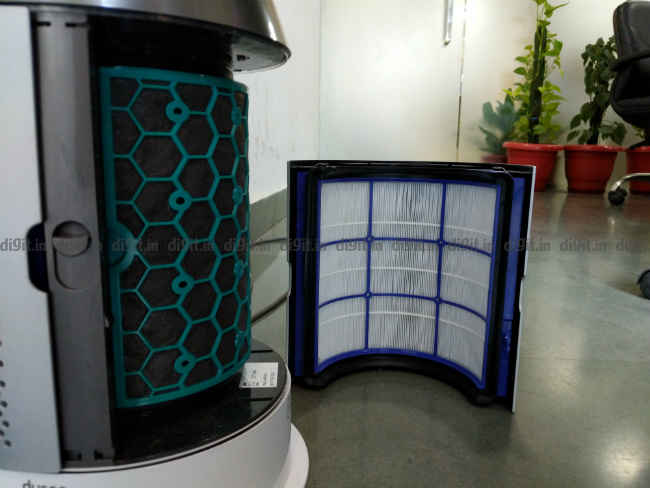
For sensors, the Dyson Pure Hot+Cool is equipped with three sensors, which not only display air quality metrics but also enable the device to work automatically. There’s a humidity and temperature sensor, along with a laser-based particulate sensor keeps track of the PM2.5 and PM10 particles in the air. A VOC sensor detects harmful gases in the air.
The sensors produce data that is displayed on the air purifier’s LCD screen and can also be accessed via the Dyson app. These sensors also kick in when the device is switched to auto mode. Going by the data generated by the sensors, the air purifier adjusts its speed automatically. In addition, the temperature sensor is used to raise a room’s temperature to the desired level, which can be set by the user.
Air heating
Dyson has added a great new feature to its lineup with the Pure Hot+Cool air purifier. The device comes equipped with ceramic heating plates, which heats the purified air before it is pushed out. The new option is a welcome addition as it works as intended and the device is surprisingly quick in spewing hot air. When one sets their desired temperature, the air purifier starts pushing out hot air till the target temperature is reached and stops automatically too. The air heating feature is a really great addition, especially during the winter, as the air purifier then also doubles up as a heater.
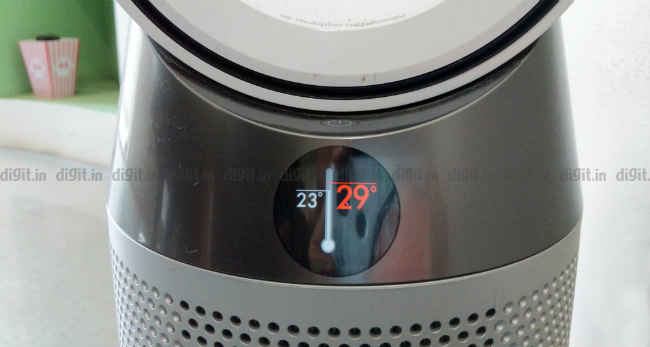
However, one must take care to ensure that kids are nowhere near the device when it is being used to heat up the air in a room. We used a heat gun to find that the sides of the air purifier can get up to 76 degrees Celcius after using the heating mode for 10 minutes. Additionally, we recorded a peak temperature of 104 degrees for the hot plates that are situated near the air purifier’s front aperture from where the air is pushed out. This is something one needs to be wary of, in case there are kids at home.
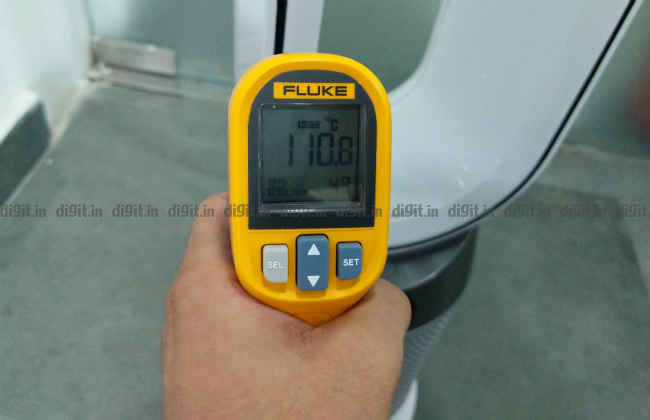
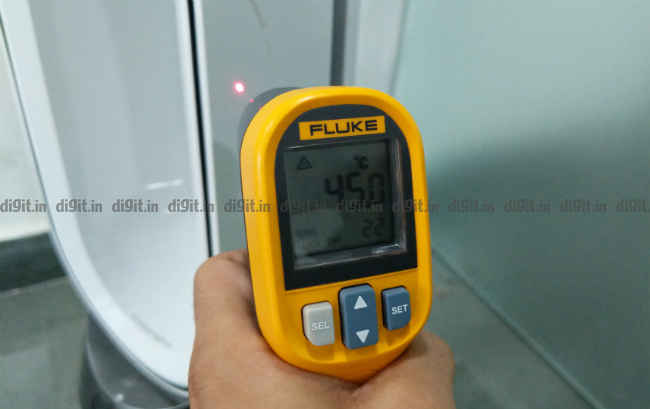
Controls and app connectivity
The Dyson Pure Hot+Cool comes with an IR remote that enables controlling the air purifier’s functions. The compact, cleanly designed remote is well-built and features tactile buttons with good feedback. There are standard buttons for switching the device on or off and increasing or decreasing its speed. While there are also buttons to increase and decrease the temperature, this doesn’t mean that the expelled air is being heated to the set level. It is more like setting a thermostat where the device will keep spewing out hot air till the ambient temperature of the room reaches the level set by the user. The remote can also be attached magnetically to the top of the air purifier’s loop and doesn’t slip off.
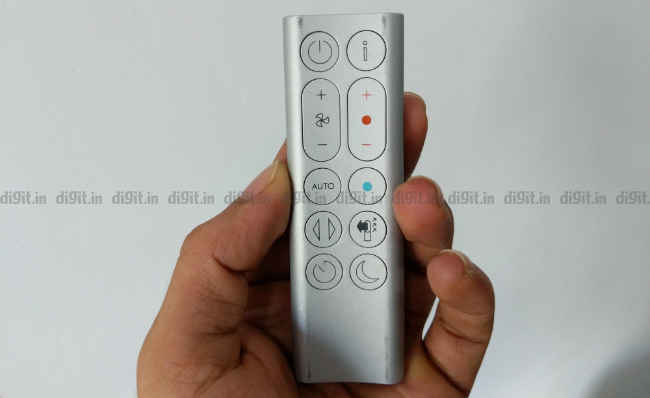
The remote can also enable oscillation, night mode and a diffused air purification feature. In night mode, the air purifier’s speed is slowed down and the LCD screen on the front is also dimmed. There’s also an auto mode, which works as we described in the filters and sensors section. The information button is a great way to go through the data being captured by the air purifier’s sensors like the current AQI or AQI levels logged over the last 24 hours. In addition, the purifier’s display shows PM2.5, PM10, VOC, and NO2 levels. However, exact values are shown only for PM 2.5 and PM 10 particles.
In this world of connected living, there’s an app for everything and it makes sense that the Dyson Pure Hot+Cool air purifier can be controlled via an app. IoT connectivity on an air purifier makes a lot of sense as one can switch the device on before reaching their home and switch it off remotely, in case it is required. It is quite easy to pair up the Dyson air purifier with the Dyson Link app and once done, one can not only control the air purifier from their phone but also access a wide range of stats.
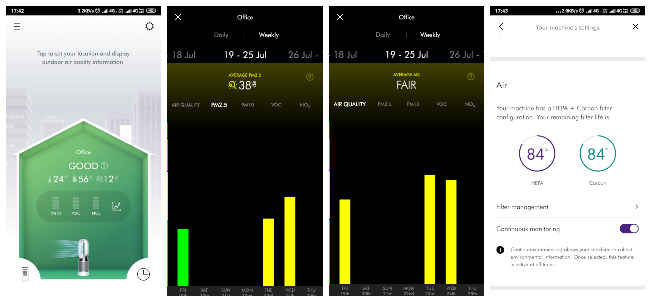
The Dyson Pure Hot+Cool connects to the local WiFi and the app features all the option, which you would find on the device’s remote control. Alongside switching the air purifier on and off, one can set the speed, oscillation angles, temperature, enable sleep mode, auto mode or diffused mode. The app also enables an additional scheduling feature so that one can set when the device is switched on and off. The air purifier’s filter life is shown in percentage and it can be checked in-app. As mentioned earlier, one can access a wide range of sensor data via the app like PM2.5, PM10, temperature, humidity, along with VOC and NO2 pollutants.
Bottomline
The Dyson Pure Hot+Cool offers some additional features and relatively better air purification over the company’s previous air purifiers. The device comes with great IoT capabilities, which enables a user to operate and check on it from anywhere in the world. In addition, this time, there’s a heating feature that is really handy and a much-welcomed addition. At Rs 54,900, the price seems too high for the features it offers. However, the company says that it is targeting a niche market and this certainly seems to be the case. For those who want to show off a futuristic-looking piece of engineering in their home that is also a good air purifier, the Dyson Pure Hot+Cool is a no brainer.
However, India being a price-sensitive market, it would be unfair to say that there are no alternatives available for it. For those who want even better air purification around the Rs 30,000 range, one can check out the Blueair Classic 280i (review). The Blueair air purifier performs well, is IoT enabled, has relatively cheaper filters and, as we found out in our review, is really silent. Then, there is the last year’s Digit Zero1 award winner in the air purifier category, the Sharp FP-J60M (review). While not IoT enabled, the air purifier offers really powerful air purification and it aced our tests in the sub Rs 35,000 price range.
[ad_2]
Source link






